How to Use Restaurant And Liquor Store Data Scraping for Smarter Decisions?
Mar 10
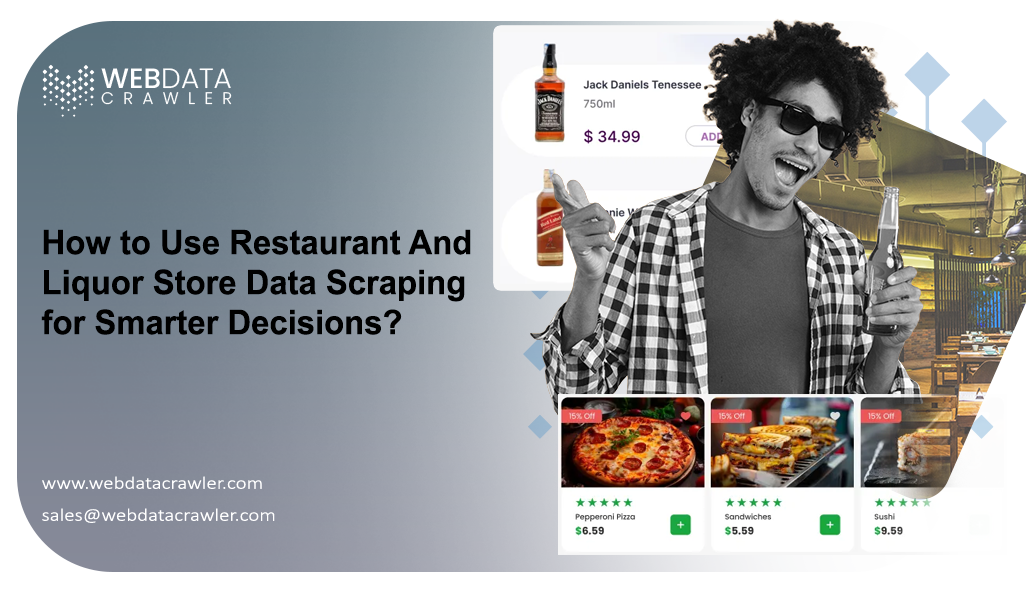
Introduction
The food and beverage industry is evolving rapidly, making real-time insights essential for businesses to stay ahead of the competition. To make informed decisions, restaurants and liquor stores must keep track of market trends, pricing fluctuations, customer preferences, and competitor strategies. This is where Restaurant And Liquor Store Data Scraping becomes indispensable.
Through Restaurant Data Scraping, businesses can analyze menu trends, pricing structures, and customer reviews, allowing them to refine their offerings and stay relevant. Likewise, Liquor Store Data Scraping empowers retailers to assess product availability, pricing trends, and promotional strategies, helping them optimize inventory management and boost profitability. By leveraging web scraping, businesses can access accurate, real-time data to make strategic, data-driven decisions in an increasingly competitive market.
This blog delves into how businesses can utilize Restaurant And Liquor Store Data Scraping to gain actionable insights, fine-tune pricing strategies, and elevate the customer experience.
What is Restaurant And Liquor Store Data Scraping
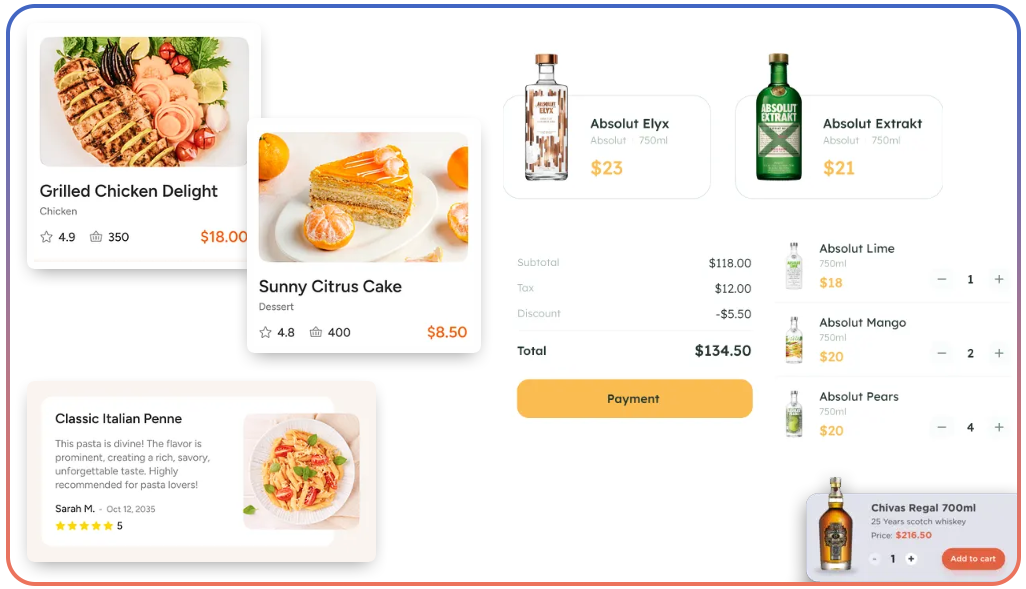
Restaurant And Liquor Store Data Scraping is the automated process of extracting crucial information from various online platforms, including restaurant websites, liquor store portals, food delivery applications, and customer review sites.
This technique enables businesses to gather valuable insights such as:
- Pricing trends for food, beverages, and alcoholic products.
- Menu items and inventory availability across different locations.
- Customer reviews and ratings to assess brand perception.
- Competitor strategies and promotions for market benchmarking.
By utilizing advanced web scraping techniques, businesses can enhance their market intelligence, streamline operational efficiency, and make data-driven decisions to stay ahead of the competition.
The Business Value of Data Collection

Leveraging Restaurant Data Scraping strategically can provide valuable benefits that drive business growth and operational efficiency. Some of the key advantages include:
1. For Restaurant Owners and Managers
As a restaurant owner or manager, leveraging data-driven insights can significantly enhance your business strategy.
- Market Gap Analysis : Understand unmet customer demands and introduce new menu items or services that cater to specific preferences.
- Competitive Menu Pricing : Compare pricing structures across similar restaurants to ensure your menu remains competitive while maximizing profitability.
- Trending Dishes Insights : Track emerging food trends and seasonal customer preferences to update your menu accordingly and attract more diners.
- Reputation Monitoring : Analyze online reviews and feedback to gauge customer satisfaction and address potential concerns proactively.
- Industry Staffing Trends : Gain insights into industry-wide staffing trends for better hiring, scheduling, and workforce management decisions.
By utilizing these insights, restaurant owners and managers can refine their strategies, enhance customer experiences, and drive long-term business growth.
2. For Liquor Store Operators
As a liquor store operator, staying ahead of the competition and adapting to shifting consumer demands is crucial. Here’s how data-driven insights can help you manage your business more effectively.
- Pricing Trend Analysis : Gain insights into pricing fluctuations across various brands and categories to maintain competitive pricing and maximize margins.
- Product Availability Tracking : Keep track of distribution patterns to ensure a well-stocked inventory and meet customer demand effectively.
- Emerging Trend Identification : Stay ahead of market shifts by recognizing popular products before they peak in demand.
- Regional & Seasonal Insights : Understand consumer behavior across locations and periods to optimize product offerings.
- Inventory Optimization : Compare competitive offerings to ensure a well-balanced selection that attracts and retains customers.
These insights allow liquor store operators to make data-driven decisions that enhance sales, improve customer satisfaction, and drive business growth.
3. For Suppliers and Distributors
Suppliers and distributors play a critical role in the success of various businesses within the food service and retail sectors. They can make informed decisions to optimize their operations and strategies by leveraging data and insights.
- Client Identification : Analyze menu profiles to determine which businesses align with your product offerings and market preferences.
- Product Penetration Tracking : Assess how well your products are integrated across different establishments to refine distribution strategies.
- Regional Pricing Analysis : Compare pricing trends across geographic regions to maintain competitiveness and adjust pricing strategies accordingly.
- Seasonal Demand Forecasting : Track menu updates to anticipate shifts in demand, enabling proactive inventory planning and marketing efforts.
Utilizing these strategies can enhance suppliers' and distributors' operations, ensuring more precise decision-making and improved market performance.
4. For Market Analysts and Consultants
Market analysts and consultants are pivotal in helping businesses make informed decisions by providing valuable insights and data-driven strategies.
- Comprehensive Market Reports : Conduct in-depth analyses of industry performance, competitive benchmarks, and consumer behavior to support strategic decision-making.
- Expansion Opportunity Insights : Leverage data insights to pinpoint high-potential markets based on demographics, economic indicators, and demand trends.
- Trend & Innovation Tracking : Monitor emerging technologies, consumer preferences, and competitive movements to stay ahead of market shifts.
- Franchise Growth Monitoring : Analyze growth patterns, market penetration strategies, and competitive positioning to identify key opportunities and risks.
By utilizing these capabilities, market analysts and consultants can provide more accurate insights, helping businesses stay competitive and make strategic decisions based on data.
Key Data Points for Extraction
Extracting relevant data is crucial for Restaurant Menu Scraping to analyze offerings, pricing, and availability. Likewise, Liquor Price Data Extraction captures pricing trends and product details. Essential data points include:
1. Restaurant Data Points
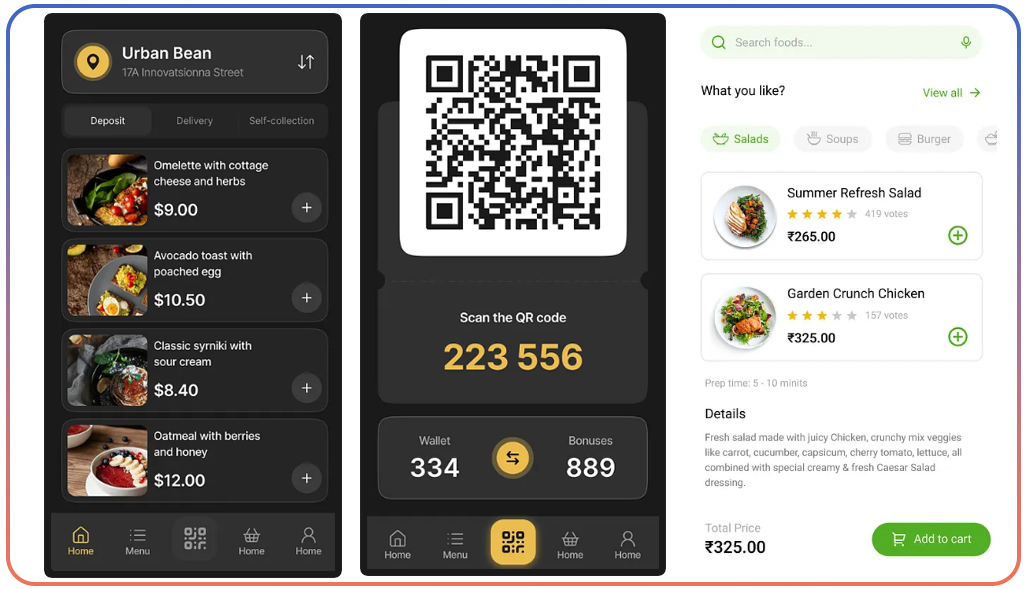
Restaurant Data Points refer to crucial information that helps analyze and optimize restaurant operations, customer experience, and competitive positioning. These data points encompass various aspects, from menu details to pricing strategies and customer feedback.
- Menu Items and Descriptions : This section includes dish names, descriptions, ingredients, and categorization (appetizers, entrées, etc.), along with nutritional details and seasonal offerings.
- Pricing Informati onCovers regular prices, special deals like happy hour discounts, bundle offers, and a comparison of delivery vs. dine-in pricing.
- Operational Details : Provides business hours, reservation systems, wait times, delivery radius, partnerships, and special services like catering and private events.
- Customer Feedback : Analyzes star ratings, review sentiment, frequent mentions of service, food quality, ambiance, and management response patterns.
2. Liquor Store Data Points
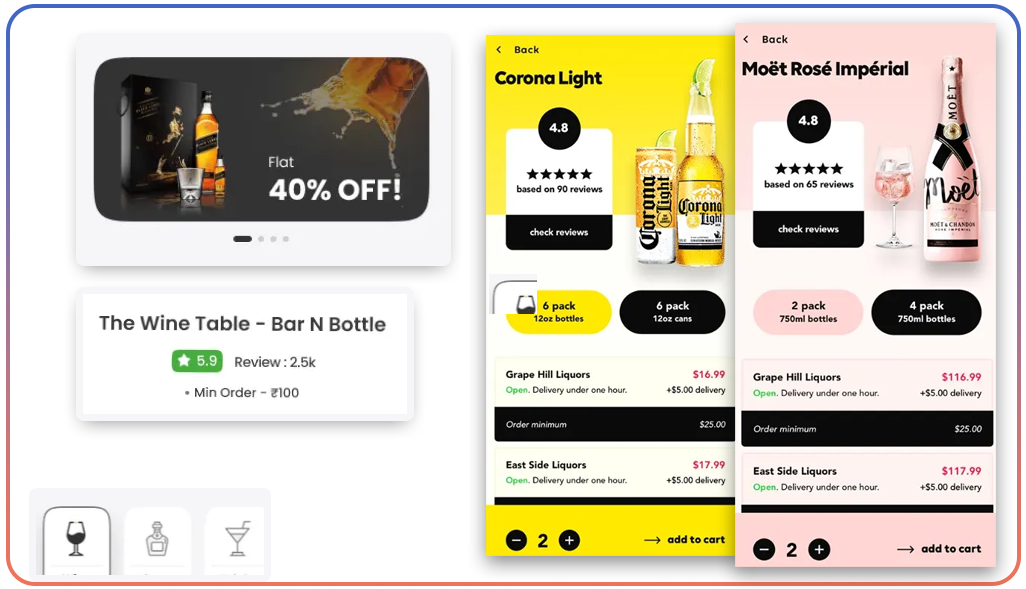
Liquor store data points are essential for analyzing product availability, pricing trends, and customer engagement. These metrics help retailers and suppliers optimize inventory, implement competitive pricing strategies, and enhance consumer experiences.
- Product Information : Brand names and categories, vintage/age details, origin information, special releases, and limited editions.
- Pricing Structure : Regular pricing, promotional discounts, bulk purchase options, and loyalty program pricing.
- Inventory Management : Stock availability, new product introductions, discontinued items, seasonal inventory patterns.
- Customer Engagement : Review ratings, popular product mentions, service satisfaction metrics, and community engagement indicators.
Legal and Ethical Considerations
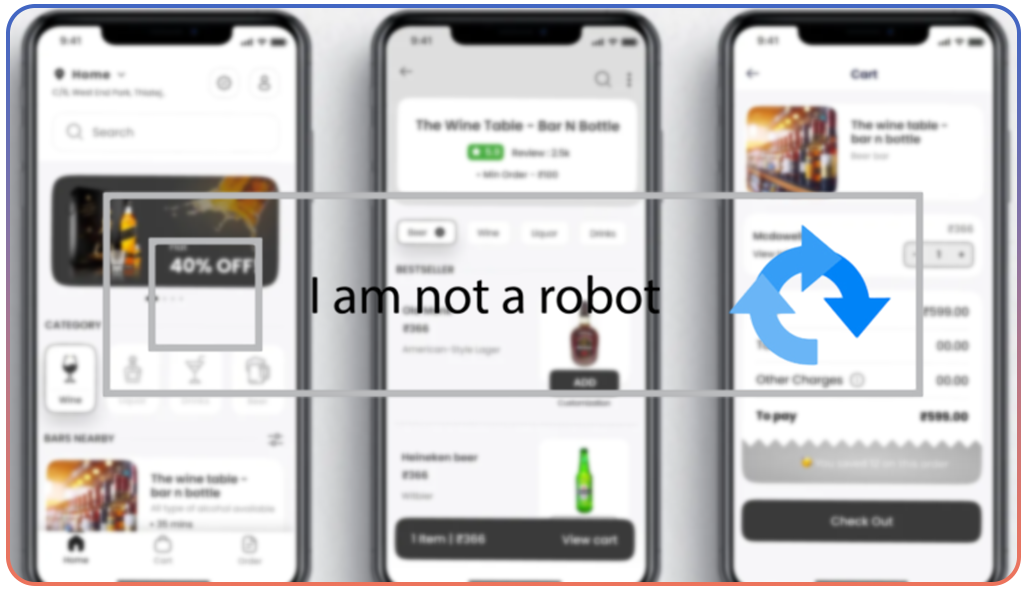
Before starting any data collection project, it is essential to understand the legal and ethical framework. When Scraping Liquor Store Pricing And Product Availability, businesses must ensure compliance with regulations. Similarly, Extracting Restaurant Reviews For Competitor Analysis should be done responsibly, following ethical data practices.
1. Legal Boundaries
Legal boundaries define the restrictions and regulations that govern data scraping practices to ensure compliance with laws and website policies.
- Respect website Terms of Service agreements.
- Avoid bypassing technical restrictions such as CAPTCHAs.
- Do not access password-protected information.
- Comply with data privacy laws like GDPR, CCPA, and similar regulations.
- Be mindful of copyright implications when using extracted content.
2. Ethical Guidelines
Ethical guidelines establish responsible web scraping practices that minimize negative impacts on websites and ensure fair usage of collected data.
- Apply reasonable rate limiting to prevent excessive server load.
- Ensure proper identification of scraping activities in user agents.
- Use collected data strictly for legitimate business purposes.
- Anonymize sensitive information before storage or analysis.
- Assess the competitive impact of your data extraction practices.
Practical Applications for Restaurants
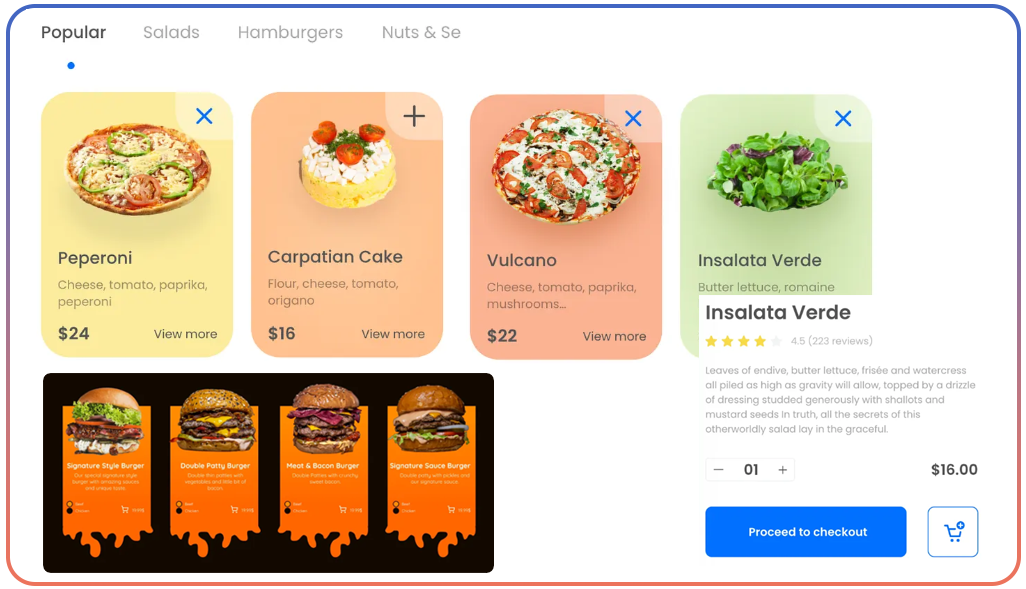
Understanding How To Scrape Restaurant Data For Business Insights is the first step. The real advantage lies in applying these insights effectively:
- Menu Engineering and Optimization : Analyzing competitor menus helps refine pricing, track trends, optimize categories, enhance descriptions, and boost upsells.
- Competitive Positioning : Review analysis uncovers service gaps, customer needs, winning promotions, adequate staffing, and operational pitfalls.
- Expansion Planning : Data-driven insights aid in competitive analysis, price mapping, cuisine gaps, service models, and demographic alignment.
- Operational Benchmarking : Industry data sets standards for turnover rates, hours, staffing, pricing strategies, and seasonal adjustments.
How Web Data Crawler Can Help You?
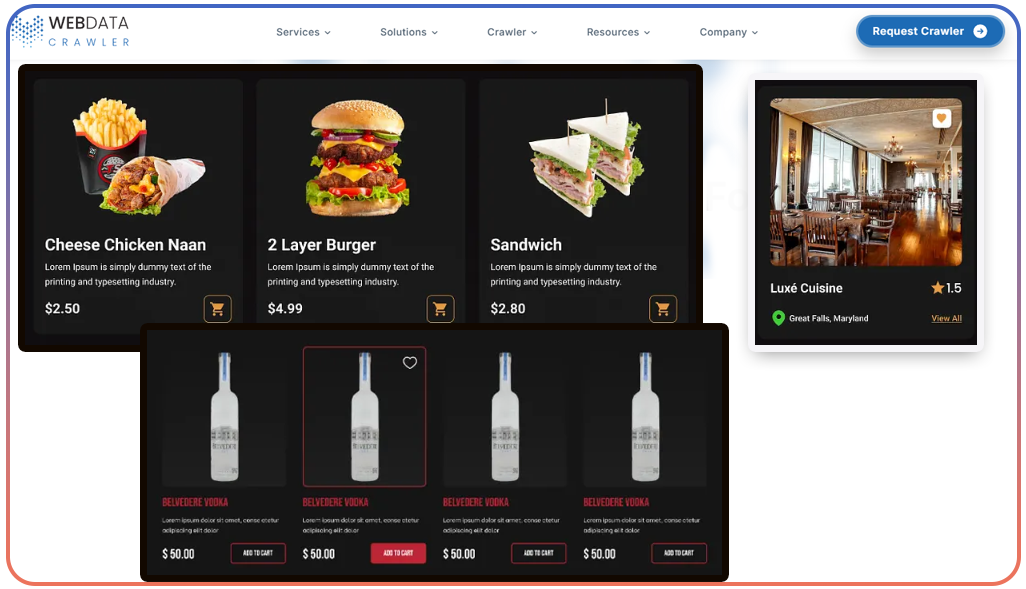
We specialize in delivering tailored data collection solutions for the food and beverage industry. Our expertise in Restaurant And Liquor Store Data Scraping has empowered countless businesses to enhance their decision-making processes with data-driven insights.
Our Specialized Services:
- Custom data collection strategies designed to align seamlessly with your unique business objectives.
- Legally compliant are solutions for secure and ethical data extraction.
- Real-time competitor monitoring systems to keep you ahead in dynamic markets.
- Automated pricing intelligence dashboards for data-driven pricing strategies.
- Review sentiment analysis and reputation monitoring to enhance brand perception.
- Market expansion opportunity identification to uncover new growth avenues.
- Custom reporting and visualization solutions for actionable business insights.
Our Service Advantage:
- Industry-Specific Expertise : Our team possesses deep knowledge of the critical data points that fuel success in the food and beverage industry.
- ble Infrastructure : Whether you operate a single outlet or manage a nationwide chain, our solutions adapt and expand to meet your evolving needs.
- Legal Compliance : Our Web Scraping Services are built with a strong focus on legal and ethical best practices, ensuring responsible data collection.
- Actionable Intelligence : We go beyond just providing raw data—we deliver meaningful insights that empower strategic decision-making.
- Integration Capabilities : Our systems are designed for seamless connectivity with your existing business tools and workflows, ensuring smooth data integration.
Conclusion
The strategic use of Restaurant And Liquor Store Data Scraping unlocks new growth opportunities for businesses in the food and beverage industry. From optimizing menus to refining pricing strategies, data-driven insights are now essential for staying ahead in a competitive market.
As discussed, the applications of Liquor Store Data Scraping are vast, but success depends on a well-planned approach, technical expertise, and adherence to legal and ethical standards.
Are you looking to leverage Restaurant Data Scraping for your business? Contact Web Data Crawler for expert guidance. Our team will craft a tailored data strategy to help you gain a competitive edge. Don’t miss out—start making more intelligent, data-driven decisions today!